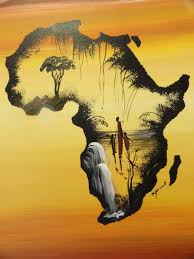One thing Black people in America do not do is have pride in their African heritage. Most do not even recognize their blackness as it relates to their ancestry in Africa. Slavery erased connections to our African and many feel they are only connected to their first ancestors to reach American shores. Ties to Africa were effectively severed.
As I have aged my hands have become darker with more lines and etchings of time. Not that I was ever a redbone, a cream coffee, or even a caramel color. I was just a lighter brown. But my color never seemed to be that of the Black people of Africa. They were black black. Does it bother me that my melanin seems to be going to the darker side of the spectrum with age? No. That is the least of my worries. I used to hear as a small child the blacker the berry the sweeter the juice. But all of the men ran after the 'high yellow' girls and the other black girls of the South tried to stay out of the sun so they would not become darker. So, I knew someone was lying with the darker the berry line. In America, the diluted Black person was seen as the prettier person.Why am I bringing this all up you may wonder? Well, are you wondering? Good. My first goal met.
I had the pleasure of meeting two well put together dark sisters one time. The first I shared a seat with on a shuttle and she somehow just began to tell me how offended she and her family were by the movie the "Help" because her grandmother and aunt were teachers in Mississippi during that time of the 1960's and her family were never maids. Black people not only distanced themselves from the darker Black people but also from those doing 'service' type work.
Oh, I had met this type before. Ashamed. Angry. How dare you think my family ever cleaned for whites while that same lifestyle still exists for Mississippians in 2024. Black people hate movies that link them to slavery and even to their origin of being black black. They see no point in constantly visiting times in history when Black people were portrayed as less than. And dark Black people were viewed as less than.
 Me and another lady had been joking and talking for hours. We were friendlier strangers. Then I said, the one thing I've been waiting to do and will accomplish in 2012 is tracing my family line back to Africa using genetics. She looked at me and said "My family is 1, 2, 3, 4, generations removed from slavery. I will never trace my family back to Africa." She seemed snappish, upset, even ignorant in not wanting to know her families roots. My mother, nor grandmother, were slaves and I loved learning genealogy as I had explained and could not wait to know what tribe I belonged to or what area of Africa my maternal ancestors originated.
Me and another lady had been joking and talking for hours. We were friendlier strangers. Then I said, the one thing I've been waiting to do and will accomplish in 2012 is tracing my family line back to Africa using genetics. She looked at me and said "My family is 1, 2, 3, 4, generations removed from slavery. I will never trace my family back to Africa." She seemed snappish, upset, even ignorant in not wanting to know her families roots. My mother, nor grandmother, were slaves and I loved learning genealogy as I had explained and could not wait to know what tribe I belonged to or what area of Africa my maternal ancestors originated. Africans think Black Americans are not black enough and have sold out and Black Americans seem to not feel any connection accept denial of Africa. What is wrong? Do Black Americans have to embrace their African roots to be seen as proud Black Americans? Are we black enough while not knowing our roots in Africa?
I wanted to label or title this blog Black Confusion or Black Hate because the lines have blurred. Every other ethnicity will go on and on telling you about their ancestral roots in Ireland, Italy, Russia, or Germany. Black Americans become offended when Africa is brought up saying they do not know anything about the country. Why does the Black community have no pride in belonging to Africa?
Are Black people still so broken until they have a battle with their darkness, lightness, origin, occupation, remembrance of lineage, or forgetfulness of their struggles for freedom? Do they just have a problem with their BLACKNESS? Does everything about their color and occupation remind them of pain?
I don't know. We say it is 'them' or 'they' who hate Black people. But I say 'we' are doing a pretty good job of it too.
So, this is my black bone I have to pick with Black people. Do we love our blackness? Or do we love our own definition of what BLACK means to each of us?












No comments:
Post a Comment